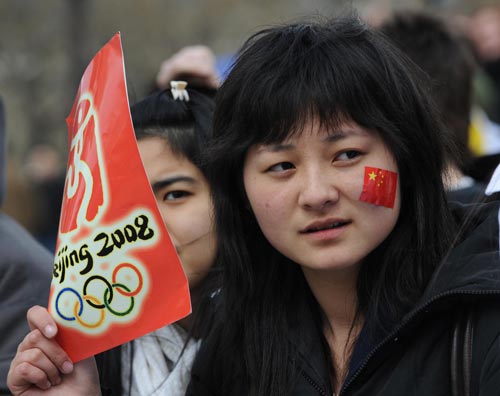Goodwill Ambassadors
- By Harvey Dzodin
 0 Comment(s)
0 Comment(s) Print
Print E-mail
China.org.cn, August 22, 2011
E-mail
China.org.cn, August 22, 2011
|
|
|
A Chinese student studying abroad waves a Chinese flag as she watches the torch relay in Paris, capital of France,on April 7, 2008. [Xinhua] |
China's dramatic economic growth has stunned the world. US Vice President Joe Biden must be left speechless comparing today's China to the one he encountered on his first visit as a young senator in 1979. Yet on one measure China is doing about as dismally as today's American and Euro-zone economies: soft power and cultural diplomacy. China will eventually get its act together here but in the meanwhile, there is a simple solution to help win hearts and minds overseas: China's students.
The United States takes a whopping 43% of the world cultural market, while China so far takes a miniscule 4%. And as powerful as China is economically, China's cultural influence index ranks only 7th among 131 countries worldwide, behind the U.S., Germany, the U.K., France, Italy, and Spain.
This lack of success goes right to bottom line of the world's perception of China. A recent BBC/Globescan poll of 28 nations showed that only in Africa and Pakistan is China viewed positively while in Asia, North America, Europe and Latin America, public opinion is either neutral, poor or negative.
China has wasted a great deal of money trying to boost its image with poorly conceived and executed marketing efforts, the latest of which was the ineffective Times Square campaign launched to coincide with President Hu's state visit to the US earlier this year. The campaign featured dozens of successful Chinese, icons in this country. Only one little problem here though: except for a few, the icons were meaningless unknowns to Americans.
Eventually China will master the art of soft power too. It has already begun by taking some excellent steps such as investing in and co-producing Hollywood films. It is showing increased sophistication in using product placement in films such as the wildly successful billion dollar-plus boxoffice global hit Transformers 3 including Chinese companies Lenovo, Metersbonwe, TCL and Yili. It has also used overseas museum exhibitions such as Xi'an's army of terracotta warriors of Emperor Qin Shihuang to conquer places like London.
Surveys show that Americans do not generally harbor ill-will toward China, as we did when the Japanese seemed like they were arrogantly buying up much of America in the 1980s. While we do have significant issues of economic competition, a strong majority of Americans prefer to undertake friendly cooperation and engagement with China rather than actively working to limit the growth of China's power.







Go to Forum >>0 Comment(s)